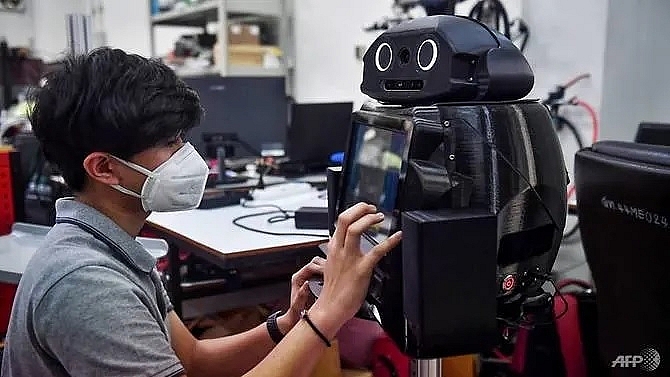Thai hospitals deploy 'ninja robots' to aid virus battle
 |
| An engineering student configures a medical robot modified to screen and observe COVID-19 coronavirus patients at the Regional Center of Robotics Technology at Chulalongkorn University in Bangkok. (Photo: AFP/Lillian SUWANRUMPHA) |
First built to monitor recovering stroke patients, the machines have been quickly repurposed to help fight the disease, which has so far killed nearly 9,000 people around the world.
They have helped staff at four hospitals in and around Bangkok to reduce their risk of infection by allowing doctors and nurses to speak to patients over a video link.
"They can stand outside the room and communicate with patients inside through the robot," said Viboon Sangveraphunsiri of Chulalongkorn University.
Later models will be designed to bring food and medicine to patients, and could also eventually be used to disinfect hospital wards, Viboon told AFP.
His engineering team is racing to build more "ninjas" - known as such because of their matte black exterior - for another 10 hospitals around the country.
Thailand has more than 200 confirmed COVID-19 infections, including at least one death. More than 40 have recovered and been discharged from hospital.
Authorities recently ordered the closure of bars, massage parlours and entertainment venues to help prevent new cases.
New rules also require visitors entering the country to produce a health certificate.
Officials have so far stopped short of imposing the full lockdowns seen in other countries in a bid to contain damage to Thailand's crucial tourism sector.
But the government's reassurances that the pandemic is under control have not stopped bouts of panic buying in grocery stores.
Doctors are also urging Thais to stay home to curb the spread of the virus.
What the stars mean:
★ Poor ★ ★ Promising ★★★ Good ★★★★ Very good ★★★★★ Exceptional
 Tag:
Tag:
Themes: COVID-19
- 67 million children missed out on vaccines because of Covid: UNICEF
- Vietnam records 305 COVID-19 cases on October 30
- 671 new COVID-19 cases recorded on October 1
- Vietnam logs additional 2,287 COVID-19 cases on Sept. 21
- People’s support decisive to vaccination coverage expansion: official
Related Contents
Latest News
More News
- France supports Vietnam’s growing role in international arena: French Ambassador (January 25, 2026 | 10:11)
- Foreign leaders extend congratulations to Party General Secretary To Lam (January 25, 2026 | 10:01)
- Russian President congratulates Vietnamese Party leader during phone talks (January 25, 2026 | 09:58)
- Worldwide congratulations underscore confidence in Vietnam’s 14th Party Congress (January 23, 2026 | 09:02)
- Political parties, organisations, int’l friends send congratulations to 14th National Party Congress (January 22, 2026 | 09:33)
- 14th National Party Congress: Japanese media highlight Vietnam’s growth targets (January 21, 2026 | 09:46)
- 14th National Party Congress: Driving force for Vietnam to continue renewal, innovation, breakthroughs (January 21, 2026 | 09:42)
- Vietnam remains spiritual support for progressive forces: Colombian party leader (January 21, 2026 | 08:00)
- Int'l media provides large coverage of 14th National Party Congress's first working day (January 20, 2026 | 09:09)
- Vietnamese firms win top honours at ASEAN Digital Awards (January 16, 2026 | 16:45)






















 Mobile Version
Mobile Version